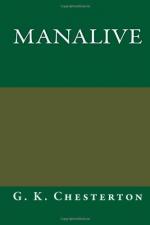Inglewood’s first instinct was to think that his perplexing friend had really gone off his head at last; there seemed so reckless a flight of irrelevancy from the tropic-pictured walls he was asked to imagine to the gray, wind-swept, and somewhat chilly suburban garden in which he was actually kicking his heels. How he could be more happy in one by imagining the other he could not conceive. Both (in themselves) were unpleasant.
“Why does everybody repeat riddles,” went on Moon abruptly, “even if they’ve forgotten the answers? Riddles are easy to remember because they are hard to guess. So were those stiff old symbols in black, red, or green easy to remember because they had been hard to guess. Their colours were plain. Their shapes were plain. Everything was plain except the meaning.”
Inglewood was about to open his mouth in an amiable protest, but Moon went on, plunging quicker and quicker up and down the garden and smoking faster and faster. “Dances, too,” he said; “dances were not frivolous. Dances were harder to understand than inscriptions and texts. The old dances were stiff, ceremonial, highly coloured but silent. Have you noticed anything odd about Smith?”
“Well, really,” cried Inglewood, left behind in a collapse of humour, “have I noticed anything else?”
“Have you noticed this about him,” asked Moon, with unshaken persistency, “that he has done so much and said so little? When first he came he talked, but in a gasping, irregular sort of way, as if he wasn’t used to it. All he really did was actions—painting red flowers on black gowns or throwing yellow bags on to the grass. I tell you that big green figure is figurative— like any green figure capering on some white Eastern wall.”
“My dear Michael,” cried Inglewood, in a rising irritation which increased with the rising wind, “you are getting absurdly fanciful.”
“I think of what has just happened,” said Michael steadily. “The man has not spoken for hours; and yet he has been speaking all the time. He fired three shots from a six-shooter and then gave it up to us, when he might have shot us dead in our boots. How could he express his trust in us better than that? He wanted to be tried by us. How could he have shown it better than by standing quite still and letting us discuss it? He wanted to show that he stood there willingly, and could escape if he liked. How could he have shown it better than by escaping in the cab and coming back again? Innocent Smith is not a madman—he is a ritualist. He wants to express himself, not with his tongue, but with his arms and legs— with my body I thee worship, as it says in the marriage service. I begin to understand the old plays and pageants. I see why the mutes at a funeral were mute. I see why the mummers were mum. They meant something; and Smith means something too. All other jokes have to be noisy—like little Nosey Gould’s jokes, for instance. The only silent jokes are the practical jokes. Poor Smith, properly considered, is an allegorical practical joker. What he has really done in this house has been as frantic as a war-dance, but as silent as a picture.”




